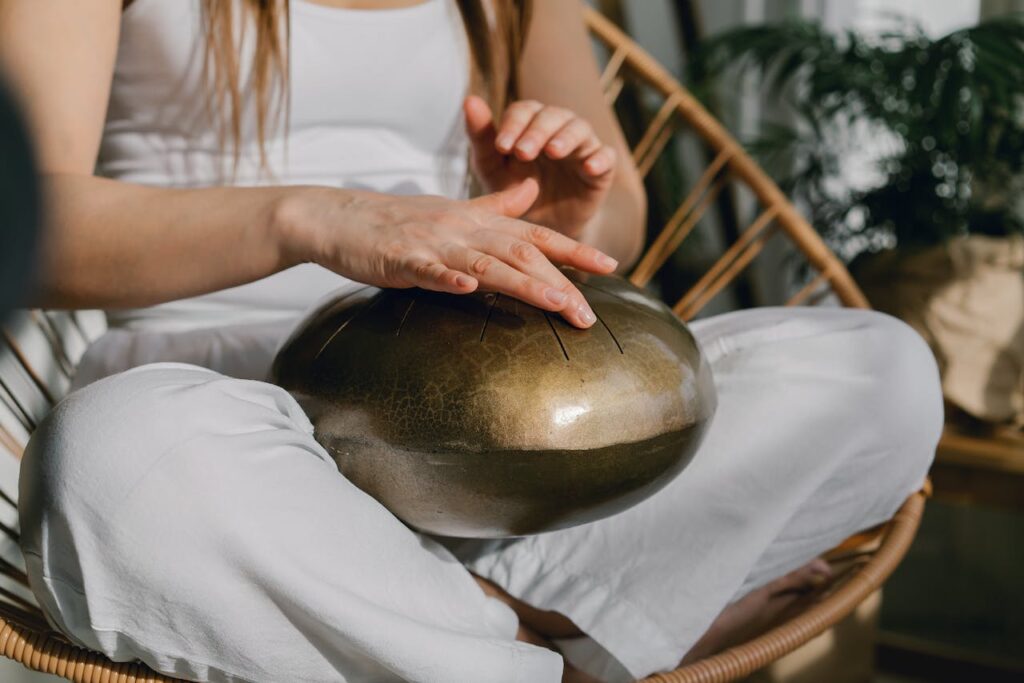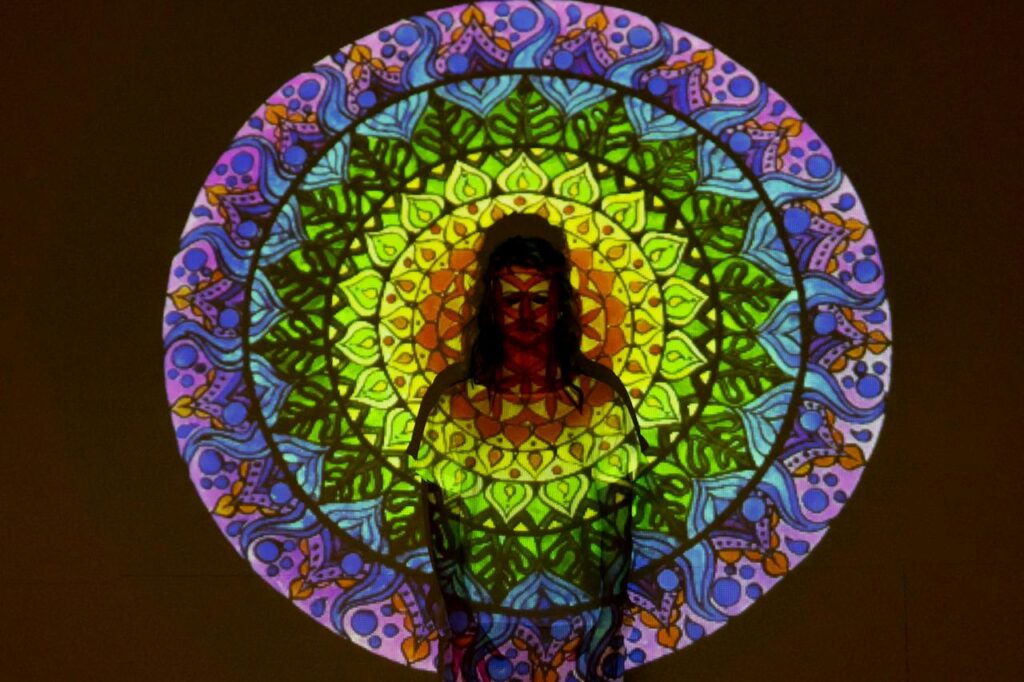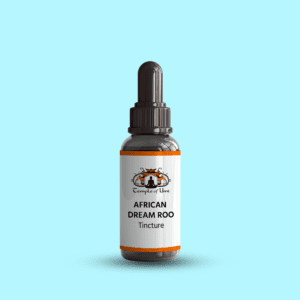Psychological effects of ayahuasca

By Temple of Umi

Table of Contents
Explore the profound psychological effects of ayahuasca, from transformative healing to spiritual growth. Discover how this ancient brew impacts mental health and consciousness.
Introduction
Ayahuasca, a potent psychoactive brew, roots itself deeply in the rich tapestry of indigenous Amazonian culture. Historically, this sacred concoction has been utilized for centuries in spiritual and healing ceremonies, blending the Banisteriopsis caapi vine with various psychoactive plants to facilitate profound experiences of introspection and spiritual enlightenment. In recent years, ayahuasca has surged in popularity across the globe, transcending its traditional boundaries to become a subject of interest within modern therapeutic practices. This burgeoning curiosity underscores a collective pursuit of alternative healing modalities, making the exploration of ayahuasca’s psychological effects not only fascinating but also vital. Understanding the multifaceted psychological impacts of ayahuasca can illuminate pathways toward psychological healing and personal growth, offering insights into both its potential benefits and risks.
Understanding Ayahuasca
Its complex composition is at the heart of ayahuasca’s mystical allure, primarily involving the Banisteriopsis caapi vine and the Psychotria viridis shrub. The vine contains harmala alkaloids and monoamine oxidase inhibitors (MAOIs), while the shrub leaves contain N, N-Dimethyltryptamine (DMT), a potent psychedelic substance. This combination creates a unique synergy, allowing DMT to exert its psychoactive effects. Traditionally, preparing ayahuasca involves cleaning, pounding, and boiling these components over several hours, if not days, resulting in a potent brew as a gateway to the spiritual realm.
The role of ayahuasca within indigenous cultures cannot be overstated. It is deeply woven into the social, spiritual, and medicinal fabric of numerous Amazonian tribes, serving as a tool for communication with the spiritual world, healing, and community bonding. Shamans or healers guide the ayahuasca ceremonies, employing chants, songs, and rituals to navigate and influence the experience, demonstrating a profound respect and understanding of this sacred medicine. Learn more.
The Psychedelic Experience
Embarking on an ayahuasca journey is to traverse through the depths of one’s psyche, marked by distinct stages that unfold from initial ingestion to the gradual return to baseline consciousness. Participants often report experiencing vivid visions, encountering symbolic imagery, or undergoing emotional and psychological revelations. These stages can vary in intensity and duration, influenced by individual physiology, the setting of the ceremony, and the emotional and spiritual readiness of the participant.
The psychological effects experienced during an ayahuasca ceremony are as diverse as they are profound. Individuals may encounter intense emotional release, insights into personal dilemmas, or feelings of interconnectedness with the universe. Such experiences can lead to significant shifts in perspective, fostering healing from psychological distress, including depression, anxiety, and trauma.
However, the journey with ayahuasca has its challenges. The variability of experiences can also lead to encounters with difficult emotions or memories, emphasizing the importance of a supportive setting and experienced guidance. Factors such as the ceremonial context, the composition of the brew, and the individual’s mental and emotional state play critical roles in shaping the ayahuasca experience, highlighting the necessity of approaching this powerful psychedelic with respect, preparation, and care.
Through a careful examination of ayahuasca’s traditional roots, composition, and the intricate stages of its consumption, one gains a deeper appreciation for its role in both indigenous cultures and modern therapeutic contexts. This understanding respects its historical significance and illuminates the potential for ayahuasca to offer profound psychological insights and healing.
Positive Psychological Effects of Ayahuasca
Enhanced Self-awareness and Introspection
- Individuals often report a profound journey into their psyche, leading to an enhanced understanding of their thoughts, behaviors, and emotions. This introspective voyage can illuminate hidden aspects of one’s self, fostering a more profound sense of self-awareness and personal insight.
The Impact on Mental Health: Depression, Anxiety, and PTSD
- Ayahuasca has been associated with significant positive effects on various mental health conditions. Participants have described reductions in symptoms of depression and anxiety, and in some cases, individuals with PTSD have reported improvements in their condition. These effects are often attributed to the introspective experiences facilitated by ayahuasca, allowing individuals to confront and process emotional traumas.
Spiritual Enlightenment and Sense of Connectedness
- A joint report among ayahuasca users is a feeling of profound spiritual awakening and a heightened sense of connectedness to the universe, nature, or a higher power. This can lead to reevaluating personal values and a shift in one’s perception of their place in the world.
Long-term Personal Growth and Transformation
- The effects of ayahuasca are not limited to the immediate aftermath of the experience but can catalyze ongoing personal transformation and growth. Individuals often emerge with a renewed sense of purpose and direction in life, leading to positive changes in behavior, lifestyle, and interpersonal relationships.

Potential Risks and Negative Effects
The Dark Side of Ayahuasca: Dealing with Challenging Experiences
- Not all experiences with ayahuasca are positive. Some individuals encounter profoundly distressing visions or emotions, leading to what is often described as a “bad trip.” These experiences can be frightening and psychologically unsettling.
Psychological Distress and the Potential for Re-traumatization
- For individuals with a history of trauma, ayahuasca can sometimes resurface traumatic memories with intense vividness, which can lead to re-traumatization if not adequately managed in a supportive setting.
The Importance of Setting and Guidance in Mitigating Negative Effects
- The setting in which ayahuasca is taken and the presence of experienced facilitators can significantly influence the outcome of the experience. Adequate preparation, support during the ceremony, and integration afterward are crucial to mitigate the risks of adverse psychological effects.
The Science Behind the Effects
Overview of Current Research on Ayahuasca’s Psychological Impact
- Emerging research highlights ayahuasca’s potential in treating various psychological conditions. Studies have documented reductions in depression and anxiety scores, suggesting a promising therapeutic avenue for mental health treatment.
Neuroscientific Perspective: How Ayahuasca Affects the Brain
- Neuroimaging studies reveal that ayahuasca impacts several brain regions associated with emotion regulation, memory, and introspection. By modulating neural activity in these areas, ayahuasca may facilitate a unique state of consciousness conducive to therapeutic outcomes.
The Therapeutic Potential of Ayahuasca in Clinical Settings
- The integration of ayahuasca in clinical settings poses both opportunities and challenges. While preliminary evidence points to its potential benefits, further research is required to fully understand its efficacy and safety and the mechanisms behind its psychological effects. The controlled, clinical use of ayahuasca could offer a novel treatment modality for psychiatric conditions that are resistant to traditional therapies.
Personal Stories and Testimonials
The journey into the depths of one’s psyche through ayahuasca can be as enlightening as it is daunting. Those who have tread this path often emerge with stories that straddle the line between transformative enlightenment and cautionary tales of the psyche’s dark corners.
- First-hand accounts: Individuals describe ayahuasca experiences as profound, often citing unprecedented insights into their personal lives, traumas, and the universe at large. These transformative experiences can lead to significant life changes, such as improved relationships, cessation of addictions, and a renewed sense of purpose. However, not all journeys are without peril, as some recount battles with inner demons, reliving of traumatic events, and challenging visions that test one’s mental fortitude.
- The role of community and support: The communal aspect of ayahuasca ceremonies plays a crucial role in the experience. The presence of experienced facilitators and a supportive group of participants can provide a sense of safety and belonging. This community support is pivotal in helping individuals process and integrate their experiences, offering a shared space for healing and understanding.
- Navigating the aftermath: Integrating the insights gained from ayahuasca into daily life—is as important as the ceremony itself. Coping strategies may include journaling, engaging in creative outlets, seeking therapy, or participating in support groups. This phase is crucial for translating profound experiences into lasting positive changes in one’s life.
Ethical and Legal Considerations
As ayahuasca’s popularity surges globally, so do the debates surrounding its use outside traditional settings, its legal status, and the ethics of its commercialization.
- The debate around traditional vs. modern use: The expansion of ayahuasca use beyond its indigenous roots into Western contexts has sparked discussions on cultural appropriation, the sanctity of conventional practices, and the adaptability of such rituals in modern therapeutic frameworks.
- Legal status worldwide: Ayahuasca’s legality varies significantly across countries. In some regions, it is protected under religious freedom laws, while in others, it remains classified as a controlled substance due to its psychoactive components. This legal patchwork complicates access and raises questions about the future of ayahuasca ceremonies globally.
- Ethical considerations: The commercialization of ayahuasca ceremonies raises ethical concerns, including the exploitation of indigenous knowledge, participant safety without standardized practices, and the sustainability of plant materials. These issues underscore the importance of approaching ayahuasca with respect, responsibility, and awareness of its complex cultural and environmental implications.

Final words
The psychological effects of ayahuasca are profound and multifaceted, offering the potential for deep healing and personal growth. Yet, these benefits come with risks and challenges, necessitating a balanced approach to its use.
- Summary of psychological effects: Ayahuasca can catalyze significant psychological breakthroughs, offering insights that may be difficult to achieve through other means. These experiences can lead to profound personal and spiritual growth, addressing deep-seated emotional and psychological issues.
- Balancing benefits and risks: While the potential benefits are significant, they must be weighed against the risks of psychological distress, the challenges of integration, and the importance of setting and guidance in the experience.
- Future of ayahuasca: As research continues to unfold the complexities of ayahuasca’s effects, its future as a tool for psychological healing looks promising, albeit with caution. The collective hope is for a path that honors ayahuasca’s traditional roots, ensures ethical and legal integrity, and embraces its healing potential with respect and care.
- Sacred Plant Medicine Retreats in Georgia
- 5 Ayahuasca Retreats in California Worth Exploring
- 7 Best Aya Retreats in America. Click here.
- Mcdonough Ayahuasca retreat
- Conley Ayahuasca retreat
- Whitesburg Ayahuasca retreat
- Brooks Ayahuasca retreat
- Gay Ayahuasca retreat
- Williamson Ayahuasca retreat
- Orchard Hill Ayahuasca retreat
- Glenn Ayahuasca retreat
- Luthersville Ayahuasca retreat
- Shady Dale Ayahuasca retreat
- Bowdon Junction Ayahuasca retreat
- Sargent Ayahuasca retreat
- Greenville Ayahuasca retreat
- Lovejoy Ayahuasca retreat
- Winston Ayahuasca retreat
- Rutledge Ayahuasca retreat
- Moreland Ayahuasca retreat
- Molena Ayahuasca retreat
- Lebanon Ayahuasca retreat
- Good Hope Ayahuasca retreat
- Haralson Ayahuasca retreat
- An Inclusive List of Psychedelic Quotes
- Mount Ayahuasca retreat
- Grantville Ayahuasca retreat
- Pine Lake Retreat near
- Rydal Ayahuasca retreat
- Porterdale Ayahuasca retreat
- Waco Ayahuasca retreat
- Temple Ayahuasca retreat
- Bethlehem Ayahuasca retreat
- Jenkinsburg Ayahuasca retreat
- Adairsville Ayahuasca retreat
- Red Oak Ayahuasca retreat
- Woodbury Ayahuasca retreat
- Cassville Ayahuasca retreat
- Redan Ayahuasca retreat
- North Decatur Ayahuasca retreat
- Grantville Ayahuasca retreat
- Hillsboro Ayahuasca retreat
- Jackson Ayahuasca retreat
- Braselton Ayahuasca retreat
- Zebulon Ayahuasca retreat
- Flovilla Ayahuasca retreat
- Auburn Ayahuasca retreat
- Warm Springs Ayahuasca retreat
- Scottdale Ayahuasca retreat
- Lithia Springs Ayahuasca retreat
- Villa Rica Ayahuasca retreat
- Grayson Ayahuasca retreat
- Sunny Side Ayahuasca retreat
- Senoia Ayahuasca retreat
- Locust Grove Ayahuasca retreat
- Chamblee Ayahuasca retreat
- Fairburn Ayahuasca retreat
- Snellville Ayahuasca retreat
- Monticello Ayahuasca retreat
- Union City Ayahuasca retreat
- Tallapoosa Ayahuasca retreat
- Bremen Ayahuasca retreat
- Hampton Ayahuasca retreat
- Monroe Ayahuasca retreat
- Marble Hill Ayahuasca retreat
- Madison Ayahuasca retreat
- Dawsonville Ayahuasca retreat
- Felton Ayahuasca retreat
- Concord Ayahuasca retreat
- Mansfield Ayahuasca retreat
- Taylorsville Ayahuasca retreat
- Roopville Ayahuasca retreat
- Turin Ayahuasca retreat
- Franklin Ayahuasca retreat
- Clarkdale Ayahuasca retreat
- Talking Rock Ayahuasca retreat
- Jersey Ayahuasca retreat
- Kingston Ayahuasca retreat
- Bostwick Ayahuasca retreat
- North Metro Ayahuasca retreat
- Meansville Ayahuasca retreat
- Social Circle Ayahuasca retreat
- White Ayahuasca retreat
- Rhode Island Ayahuasca retreat
- Maryland Ayahuasca retreat
- Delaware Ayahuasca retreat
- New Jersey Ayahuasca retreat
- Connecticut Ayahuasca retreat
- Massachusetts Ayahuasca retreat
- Hampshire Ayahuasca retreat
- Pennsylvania Ayahuasca retreat
- New York Ayahuasca retreat
- Florida Ayahuasca retreat
- South Carolina Ayahuasca Retreat
- North Carolina Ayahuasca Retreat
- West West Virginia Ayahuasca retreat
- Virginia Ayahuasca retreat
- Ohio Ayahuasca retreat
- Alabama Ayahuasca retreat
- Mississippi Ayahuasca retreat
- Tennessee Ayahuasca retreat
- Kentucky Ayahuasca retreat
- IndianaAyahuasca retreat
- ILLINOIS Ayahuasca retreat
- Missouri Ayahuasca retreat
- Arkansas Ayahuasca retreat
- Louisiana Ayahuasca retreat
- Texas Ayahuasca retreat
- Oklahoma Ayahuasca retreat
- KansasAyahuasca retreat
- Ayahuasca retreats near me in Experiment.
- A wellness retreat in Georgia
- What is Ayahuasca?
- Embark on a Journey of Transformation with Spiritual Healing
- Unveiling Healing Energy at the Temple of Umi
- 10 Energy Healing Techniques to Transform Your Life
- Where to get Ayahuasca in the USA
- Top Ayahuasca retreats in the USA. Learn more.
- Cost of Ayahuasca Retreat: Balancing Cost and Experience. Learn more.
- What is trauma bonding?
- A Journey into the Healing Properties of Psychedelic Mushrooms. Learn more.
- Ayahuasca Retreat Georgia – Experience Spiritual Awakening
- Spiritual Retreats Georgia
- Shaman in America Exploration
- Shamanism – Shamanic healing
- Shaman Healing Guide
- Ayahuasca ceremonies Ayahuasca ceremonies near you in the USA
- Ayahuasca Experience
- DMT Journey, Benefits, and Side Effects
- Iowaska – What is it?
- Plant medicine retreats in Georgia
- Why massage is beneficial, according to a cardiologist.
- Are mushrooms truffles – What Is a Truffle?
- 11 Best Ayahuasca Retreats in the USA for Spiritual Healing
- What is Rapé?
- What is a Tincture?
- Where to find Ayahuasca near me
- Healing retreats USA
- Best Retreats USA









